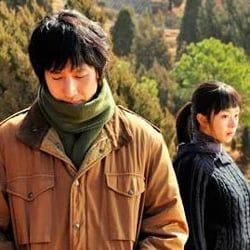Tribeca Review: Paju

Taking place over an eight year span, Paju is the story of Joongshik (Lee Sun Kyun), a man who, after a traumatizing incident returns to his hometown, Paju, South Korea. While looking for his place in the world and working as a study group teacher, he meets Eunsoo (Shim Yi Young) and the two quickly fall in love. Eunsoo’s sister, Eunmo (Seo Woo), a student in Joongshik’s class, objects to their relationship, however, and does her best to separate them. When tragedy hits Joongshik again, he and Eunmo are forced together from circumstance and the nature of their relationship is forced into the open.
While the film is visually beautiful, director Park Chan-Ok repeatedly contrasting spots of bright colors with deep grays and blues that cover the city, the film is structured using a non-linear narrative that forces the audience to juggle multiple story points at a time before flashbacks resolve them.
The opening scene in the film sees Eunmo traveling in a taxi through dense fog, cars on the road forced to use their emergency blinkers to stay visible, and the visual truly sets the mood for the film. Regularly employing rainy weather and dense clouds through the small Korean city, the mise en scene of each film matches the tone perfectly. Scenes where a task force protests the demolition of a building appear bleak and dreary even after successfully holding off the crew, acknowledging the forces that are against them. Throughout the film, Joongshik tries to abandon his past, keeping it secret even from those he cares about, but Chan-Ok uses the atmosphere to perfection as a dark cloud he cannot escape.
Had the story been as a straight narrative, it could have been monumentally successful. Unfortunately, this was not how the director and writer Yu-rim Lee decided to construct it. Only giving the audience time stamps of “Eight Years Ago,” “Seven Years Ago” and “Three Years Ago,” the film never establishes a present for which the past can relate to, nor does it show how much time passes in each segment. The result of this is a disoriented audience that suddenly sees one of the main characters completely disappear without explanation, effects of actions Joongshik has taken without witnessing cause, and age confusion. In spite of the fact that eight years pass from beginning to end, Seo Woo plays the character at all stages without any difference in appearance. Presumably, we see her go from age 10 to 18 with no physical changes. Unless they are putting something in the water in South Korea, this simply doesn’t make any sense.
Purely from an aesthetic point of view, Paju is a beautiful film and contains powerful performances from its leads. The film hits on some truly remarkable notes about the nature of relationships, personal demons, and running from the past. The only problem is that it simply couldn’t get out of its own way.
Follow along with all of our special, Tribeca 2010 coverage right here.
CINEMABLEND NEWSLETTER
Your Daily Blend of Entertainment News

Eric Eisenberg is the Assistant Managing Editor at CinemaBlend. After graduating Boston University and earning a bachelor’s degree in journalism, he took a part-time job as a staff writer for CinemaBlend, and after six months was offered the opportunity to move to Los Angeles and take on a newly created West Coast Editor position. Over a decade later, he's continuing to advance his interests and expertise. In addition to conducting filmmaker interviews and contributing to the news and feature content of the site, Eric also oversees the Movie Reviews section, writes the the weekend box office report (published Sundays), and is the site's resident Stephen King expert. He has two King-related columns.
Most Popular


